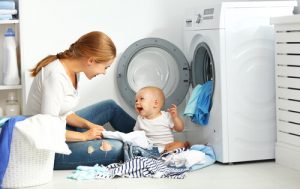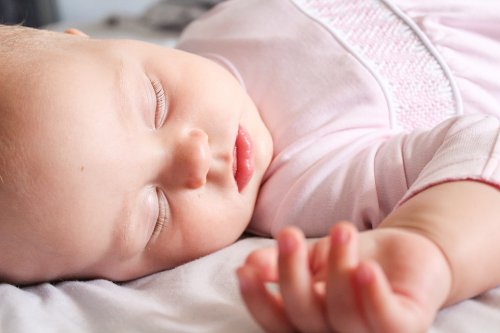7 Tips for Washing Baby Clothes

When it comes to washing baby clothes, it’s best to be on the safe side and read up on the best advice.
Babies have sensitive skin, which can react badly to detergents that contain color, fragrances, tints or dyes. Some little ones may have an allergic reaction to certain detergents.
If you’re concerned about caring for your baby’s skin, there’s more to keep in mind.
If you buy mass-produced baby clothes, particularly cheap ones, you may be exposing your little one to potentially harmful chemicals. These can lead to allergic reactions or dermatitis.
7 tips for washing baby clothes
Below, you’ll find seven tips to keep in mind when you’re washing baby clothes:
1. Wash baby clothes before use
The first tip, and a very important one, is to always wash new baby clothes before you dress your child in them.
Unless you buy organic cotton, your baby’s new clothing may contain traces of harmful chemicals, and a wash will help get rid of them.
Washing baby clothes before the first wear helps protect your baby’s delicate skin and keep them comfortable.
Other items that will be in direct contact with your baby’s skin, such as sheets or coverlets, should also be washed before use.
2. Neutral detergent just for babies
We recommend using a mild, eco-friendly detergent. This way, you can be sure not to contaminate your baby’s clothing with unnecessary synthetic additives.
Most major detergent brands produce a product line especially for babies, which are generally labelled as being suitable for sensitive skin.
The product you use should be free from color, dyes, perfume or fragrance. This reduces the risk of an allergic reaction.

3. Stay away from fabric softener
Avoid fabric softener for washing baby clothes. It is always a good idea to limit the number of potentially irritating chemicals that your child is exposed to.
Cases of infant dermatitis are on the rise, and the best way to reduce the risk is to stay away from any product that is not essential.
“Baby clothes and other items that will be in direct contact with your baby’s skin, such as sheets or coverlets, should also be washed before use.”
4. Always Read the label
This might seem obvious, but it’s important to pay attention to the label when washing baby clothes. In addition to the washing instructions, follow the instructions for drying the garment without damaging it.
As with any other item of clothing, the label will tell you how to keep your baby’s clothing looking its best.
5. Use fabric conditioner
Soft fabric is better for sensitive skin. A fabric conditioner relaxes the fibers in the cloth, keeping your baby’s clothing and bedding soft.
Look for a product that is suitable for sensitive skin, with a hypoallergenic formula and no added fragrance. Always read the package and the garment label for instructions.
6. Wash cloth diapers separately
Washing cloth diapers can be a complicated business. To avoid spreading germs, keep wet, soiled cloth diapers apart. Don’t mix them with other clothing in the washing machine.
In general, a soak in cold water followed by a hot wash cycle will be enough to get the job done. If the diapers still smell dirty, wash them again.

7. Sort your baby’s clothes
A final tip for washing baby clothes is to separate your child’s laundry, keeping whites and dark colors apart. Keeping flame-retardant clothing separate will help preserve the special coating that makes these garments resistant to fire.
If necessary, sort clothes that need to be washed at a lower temperature or on a gentle cycle into a separate laundry pile.
In general, baby clothes don’t get too dirty. You can hand wash or use a machine. If you don’t have eco-friendly detergent, any product formulated for sensitive skin will be suitable.
We hope this list of 7 tips for washing baby clothes will be useful. Keep them in mind to make your next laundry load a little easier!
When it comes to washing baby clothes, it’s best to be on the safe side and read up on the best advice.
Babies have sensitive skin, which can react badly to detergents that contain color, fragrances, tints or dyes. Some little ones may have an allergic reaction to certain detergents.
If you’re concerned about caring for your baby’s skin, there’s more to keep in mind.
If you buy mass-produced baby clothes, particularly cheap ones, you may be exposing your little one to potentially harmful chemicals. These can lead to allergic reactions or dermatitis.
7 tips for washing baby clothes
Below, you’ll find seven tips to keep in mind when you’re washing baby clothes:
1. Wash baby clothes before use
The first tip, and a very important one, is to always wash new baby clothes before you dress your child in them.
Unless you buy organic cotton, your baby’s new clothing may contain traces of harmful chemicals, and a wash will help get rid of them.
Washing baby clothes before the first wear helps protect your baby’s delicate skin and keep them comfortable.
Other items that will be in direct contact with your baby’s skin, such as sheets or coverlets, should also be washed before use.
2. Neutral detergent just for babies
We recommend using a mild, eco-friendly detergent. This way, you can be sure not to contaminate your baby’s clothing with unnecessary synthetic additives.
Most major detergent brands produce a product line especially for babies, which are generally labelled as being suitable for sensitive skin.
The product you use should be free from color, dyes, perfume or fragrance. This reduces the risk of an allergic reaction.

3. Stay away from fabric softener
Avoid fabric softener for washing baby clothes. It is always a good idea to limit the number of potentially irritating chemicals that your child is exposed to.
Cases of infant dermatitis are on the rise, and the best way to reduce the risk is to stay away from any product that is not essential.
“Baby clothes and other items that will be in direct contact with your baby’s skin, such as sheets or coverlets, should also be washed before use.”
4. Always Read the label
This might seem obvious, but it’s important to pay attention to the label when washing baby clothes. In addition to the washing instructions, follow the instructions for drying the garment without damaging it.
As with any other item of clothing, the label will tell you how to keep your baby’s clothing looking its best.
5. Use fabric conditioner
Soft fabric is better for sensitive skin. A fabric conditioner relaxes the fibers in the cloth, keeping your baby’s clothing and bedding soft.
Look for a product that is suitable for sensitive skin, with a hypoallergenic formula and no added fragrance. Always read the package and the garment label for instructions.
6. Wash cloth diapers separately
Washing cloth diapers can be a complicated business. To avoid spreading germs, keep wet, soiled cloth diapers apart. Don’t mix them with other clothing in the washing machine.
In general, a soak in cold water followed by a hot wash cycle will be enough to get the job done. If the diapers still smell dirty, wash them again.

7. Sort your baby’s clothes
A final tip for washing baby clothes is to separate your child’s laundry, keeping whites and dark colors apart. Keeping flame-retardant clothing separate will help preserve the special coating that makes these garments resistant to fire.
If necessary, sort clothes that need to be washed at a lower temperature or on a gentle cycle into a separate laundry pile.
In general, baby clothes don’t get too dirty. You can hand wash or use a machine. If you don’t have eco-friendly detergent, any product formulated for sensitive skin will be suitable.
We hope this list of 7 tips for washing baby clothes will be useful. Keep them in mind to make your next laundry load a little easier!
This text is provided for informational purposes only and does not replace consultation with a professional. If in doubt, consult your specialist.








